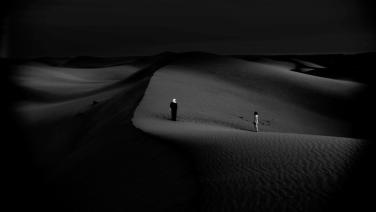
'Fajr' has a double meaning in Arabic: it means dawn, and also the 'adhan' —song call to pray— that sounds just before dawn from mosques. These songs burst 5 times a day in Muslim populations. Words fly over kasbahs, palm groves, dunes... As a reminder of that, beyond everyday’s life, a spiritual one coexists. When the voice of the song comes, everyday life’s rhythm takes another density.
We enter into a different way of experiencing time: definitely more introspective, an inner time, and therefore more open and deep. The song thus represents an interruption, a stopover, and once completed, the normal rhythm is again restored.
The desert, mythical spiritual retreat space, with its empty shapes and suspended time has invited multitude of hermits and prophets to loneliness. "You should go to the desert 40 days and slim down" said Nietzsche. Desert transforms, in reaction to its spaciousness, from the condensation in oneself. The open space around you, without a particular visual stimulus to hold on —Borges spoke about the horizontal vertigo he felt in the desert— takes you to immerse into yourself. A meditative concentration that can lead a hermit, ultimately, to a state of spiritual ecstasy, a depersonalization: go out of oneself and dilute in the Whole.
The Wall hosts the screening in loop of the project by Lois Patiño 'Fajr'.'Fajr' has a double meaning in Arabic: it means dawn, and also the 'adhan' —song call to pray— that sounds just before dawn from mosques.
